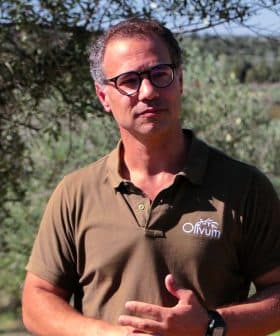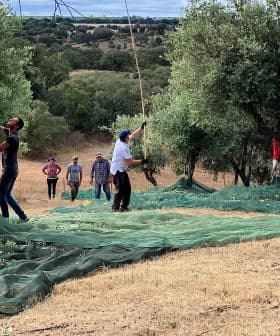Portugal’s Transition to Modern Farming Yields Another Record Harvest
Portugal will produce 150,000 tons of olive oil in the 2021-22 crop year. Favorable weather and the sector’s continuing modernization were attributed to the bumper harvest.
 Alentejo, Portugal
Alentejo, PortugalPortugal’s olive oil producers are expecting record-breaking production of 150,000 tons in the 2021/22 crop year due to a combination of factors including the sector’s growth and good soil and climate conditions, with 95 percent of the yield meeting the requirements of virgin and extra virgin olive oil. The country’s investment in technology and high-density olive groves is driving this increase in production, with a 2020 study suggesting that Portugal could become the third-largest producer of olive oil in the world by 2030.
Olive oil producers in Portugal are expecting “record-breaking production,” with initial estimates forecasting a yield of 150,000 tons in the 2021/22 crop year.
The anticipated production is the result of many groves entering an on-year in the olive’s natural alternate bearing cycle and “a combination of the sector’s growth, the application of precision technology and the good soil and climate conditions this year,” said Gonçalo Almeida Simões, the executive director of the Alentejo Olive Oil Association (Olivum).
See Also:2021 Harvest UpdatesAccording to Simões, Portugal’s olive production sector is at the top of the ranking in terms of environmental sustainability, resulting from the reduced application of phytopharmaceuticals, reduced use of water and appropriate carbon capture.
Additionally, the country takes pride in its ability to produce high-quality olive oil, with 95 percent of this year’s yield meeting the requirements of virgin and extra virgin olive oil, which Simões claimed is higher than any other major olive oil-producing nation.
He attributed Portugal’s consistently high-quality and steadily increasing olive oil yields to the rapid modernization of the sector. Super-high-density olive groves are “responsible for 80 percent of national olive oil production,” he added.
The 2021/22 crop year marks the seventh consecutive on-year (dating back to the 2009/10 crop year) in which Portuguese production broke records.
At the heart of this push for modernization is Alentejo. The southern Portuguese region accounts for one-fourth of Portugal’s landmass and was responsible for 85 percent of this year’s harvest.
See Also:Portuguese Producers Continue to Demonstrate Quality at World CompetitionA 2020 study conducted by Consulai and Juan Vilar Strategic Consultants showed that Portugal could be the third-largest producer of olive oil in the world by 2030. As of the 2020/21 crop year, Portugal is the eighth largest.
According to the study, Portugal’s ability to increase its olive oil production is driven by the country’s investment in technology and high-density olive groves, where olive growers have changed from traditional varieties to more efficient cultivars.
While traditional olive groves normally have about 250 trees per hectare, high-density groves can accommodate up to 1,000 trees. On average, the traditional grove in Alentejo produces 7.5 tons; however, super-high-density groves yield 20 to 29 tons per hectare.
According to forecasts, as more farmers convert from traditional to intensive cultivation, Portugal’s olive oil production will continue to grow.









